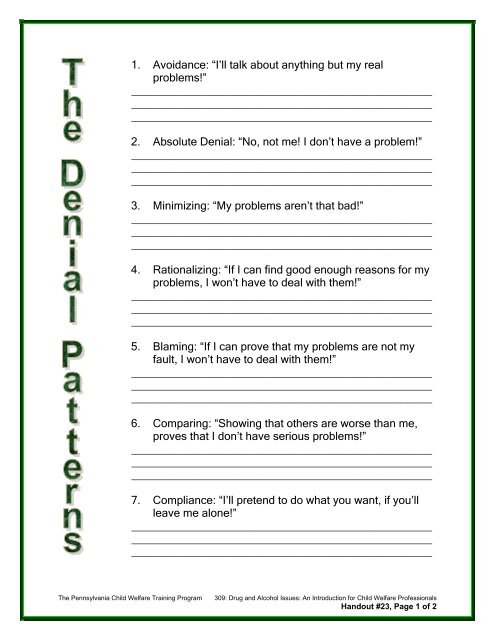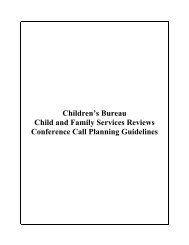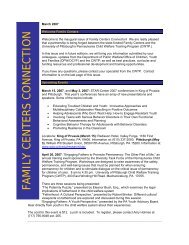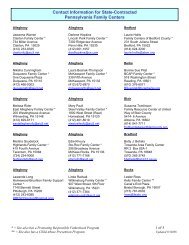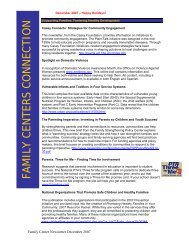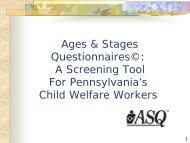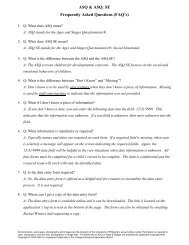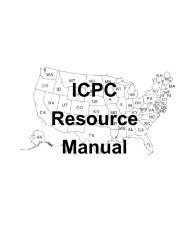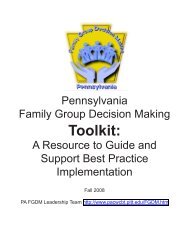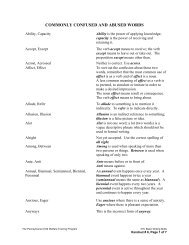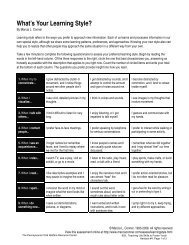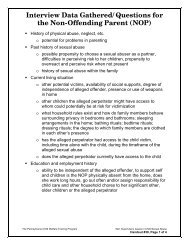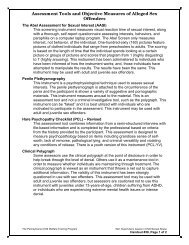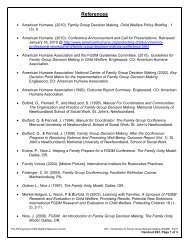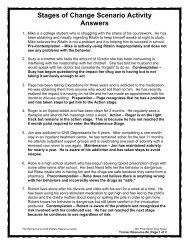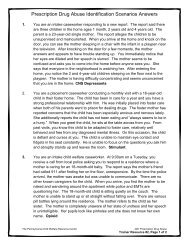Handout #23 The Denial Patterns - Pennsylvania Child Welfare ...
Handout #23 The Denial Patterns - Pennsylvania Child Welfare ...
Handout #23 The Denial Patterns - Pennsylvania Child Welfare ...
You also want an ePaper? Increase the reach of your titles
YUMPU automatically turns print PDFs into web optimized ePapers that Google loves.
1. Avoidance: “I’ll talk about anything but my real<br />
problems!”<br />
________________________________________________<br />
________________________________________________<br />
________________________________________________<br />
2. Absolute <strong>Denial</strong>: “No, not me! I don’t have a problem!”<br />
________________________________________________<br />
________________________________________________<br />
________________________________________________<br />
3. Minimizing: “My problems aren’t that bad!”<br />
________________________________________________<br />
________________________________________________<br />
________________________________________________<br />
4. Rationalizing: “If I can find good enough reasons for my<br />
problems, I won’t have to deal with them!”<br />
________________________________________________<br />
________________________________________________<br />
________________________________________________<br />
5. Blaming: “If I can prove that my problems are not my<br />
fault, I won’t have to deal with them!”<br />
________________________________________________<br />
________________________________________________<br />
________________________________________________<br />
6. Comparing: “Showing that others are worse than me,<br />
proves that I don’t have serious problems!”<br />
________________________________________________<br />
________________________________________________<br />
________________________________________________<br />
7. Compliance: “I’ll pretend to do what you want, if you’ll<br />
leave me alone!”<br />
________________________________________________<br />
________________________________________________<br />
________________________________________________<br />
<strong>The</strong> <strong>Pennsylvania</strong> <strong>Child</strong> <strong>Welfare</strong> Training Program<br />
309: Drug and Alcohol Issues: An Introduction for <strong>Child</strong> <strong>Welfare</strong> Professionals<br />
<strong>Handout</strong> <strong>#23</strong>, Page 1 of 2
8. Manipulating: “I’ll only admit that I have problems, if you<br />
agree to solve them for me!”<br />
________________________________________________<br />
________________________________________________<br />
________________________________________________<br />
9. Flight into Health: “Feeling better means that I’m cured!”<br />
________________________________________________<br />
________________________________________________<br />
________________________________________________<br />
10. Recovery by Fear: “Being scared of my problems will<br />
make them go away!”<br />
________________________________________________<br />
________________________________________________<br />
________________________________________________<br />
11. Strategic Hopelessness: “Since nothing works, I don’t<br />
have to try.”<br />
________________________________________________<br />
________________________________________________<br />
________________________________________________<br />
12. <strong>The</strong> Democratic Disease State: “I have the right to<br />
destroy myself and no one has the right to stop me!”<br />
________________________________________________<br />
________________________________________________<br />
________________________________________________<br />
Developed by Terence Gorski N.C.A.C II, C.S.A.C and the CENAPS<br />
Corporation with regard to <strong>Denial</strong> Management Counseling©.<br />
Resource: Gorski, T.T. "<strong>Denial</strong> Management Counseling," Paradigm magazine, Vol. 6(3) and Vol. 5(2):<br />
pgs. 20-21 (Summer 2001). Retrieved November 14, 2005 from the World Wide Web at<br />
http://www.onlineparadigm.com/archives/164-S01_PT.GI.pdf Used with permission of<br />
Paradigm magazine, P.O. Box 793768, Dallas, TX 75379 (972) 250-1110<br />
<strong>The</strong> <strong>Pennsylvania</strong> <strong>Child</strong> <strong>Welfare</strong> Training Program<br />
309: Drug and Alcohol Issues: An Introduction for <strong>Child</strong> <strong>Welfare</strong> Professionals<br />
<strong>Handout</strong> <strong>#23</strong>, Page 2 of 2


